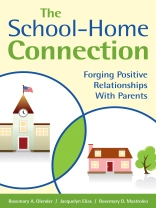‘A useful resource for all educators with practical suggestions to help close the gap between school and home. Through analogies and shared reflections on real-life examples, the authors provide guidance for dealing effectively with parents, understanding the importance of family dynamics, and considering the effects of personality types on relationships.’
—Annette Speach, Director of Human Resources
North Syracuse Central School District, NY
‘Becoming skilled in relationships is the foundation for successful home-school collaboration, and these authors provide the why′s and how-to′s in a very readable form.’
—Bonnie Dunn, Retired School Social Worker
The Collaborative School, New Gloucester, ME
The keys to bridging the gap between school and home!
Research has consistently shown that student success is directly related to the strength of the relationships between parents and schools. This book provides teachers and administrators with tools to build a foundation for student success based on positive relationships with students and their families.
Drawing on original research and their professional experiences, the authors identify the common sources of both negative and positive school-home relationships. The book presents a comprehensive approach to building closer connections and includes:
- Tools to help educators develop a deeper understanding of the communities they serve
- Strategies for improving interpersonal skills and communication skills
- A chapter on the importance of documenting and celebrating school events
- Guidelines for creating three distinct levels of parental participation in schools
With suggestions for cultivating a community network of support services and a summary of lessons for forging constructive relationships, The School-Home Connection is an essential tool for educators looking to strengthen the learning community and increase student achievement.
สารบัญ
Preface
Acknowledgments
About the Authors
1. Committing to the Relationship
Benefits to the Student
Benefits to the Teacher
Benefits to the Parent
Benefits to the Class
Benefits to the School
Benefits to the School District
Summary
2. Recognizing Different Personalities
Determining Personality
Effects of Personalities on Your Relationships
Implications
Dealing With Difficult Parents
Summary
3. Identifying Potential Red Flags
Recognizing Red Flags
The Likelihood Rating Scale
Parent and Family Conditions
Teacher Conditions
Administrator Conditions
Summary
4. Honing Solid Communication Skills
Verbal Communication Obstacles
Nonverbal Communication Obstacles
Summary
5. Adopting Key Rules
Rule 1: Be Respectful
Rule 2: Be Proactive
Rule 3: No Surprises
Rule 4: 24 Hours
Rule 5: No Dump Trucks Allowed
Rule 6: Document
Rule 7: Be Prepared
Rule 8: ‘I Don′t Know’
Rule 9: Never Say Never
Rule 10: Never Lie
Summary
6. Using Flexibility to Enhance Relationships
Common Family Issues Needing Accommodation
Failing Students
Students With Disabilities
Families of Divorce or Separation
Illness or Death of a Close Family Member
Non-English-Speaking and Low-Literacy Families
Counterproductive Family Dynamics
Summary
7. Documenting and Celebrating School Events
What Do We Need to Document?
Quick, Easy, and Routine Daily Documentation Methods
Weekly or Monthly Newsletters
Specialized Daily Contacts
Conferences
DVDs/CDs
Back-to-School Nights and Open Houses
Summary
8. Connecting Home and School
Levels of Parent Participation
Level 1: General Parental Support of School Activities
Level 2: Parental Involvement in Daily School Events
Level 3: Parental Involvement in Decision-Making Processes
Summary
9. Cultivating Resources
Where Do You Start?
Compiling a List of Family Resources
What Should Your Resource List Look Like?
One Step Further
Summary
10. Summarizing Global Lessons Learned
Lesson 1: Keep the Student Front and Center
Lesson 2: Be the Best Communicator You Can Be
Lesson 3: Become User-Friendly
Lesson 4: Be Proactive
Lesson 5: View Parents and Families as Opportunities to Bring Diversity, Interests, and Talents into the Classroom and School
Lesson 6: Above All, Keep and Use a Sense of Humor
Summary
Resource A: Discover Your Personality
Resource B: The Animal Test
Resource C: Personality Types
References and Recommended Readings
Index
เกี่ยวกับผู้แต่ง
Rosemary Mastroleo is a retired school teacher and supervisor now living in Southwest Florida. Throughout her career, Mastroleo was responsible for the set up and design of special education programs in public school settings. She focused her efforts on identifying the strengths and weaknesses of each child in order to build a successful academic program both at home and at school. Mastroleo’s consistent efforts to build cooperative relationships with families enhanced the success of her students and her programs. Prior to becoming an administrator, Mastroleo taught for 17 years in the North Syracuse Central School District in central New York. During that time, she was a first grade teacher, an elementary counselor, a resource teacher, and then an itinerant junior and senior high school teacher. Following her tenure as a teacher, Mastroleo became a program monitor for the special education department in the North Syracuse District. Her duties included overseeing self-contained special education classes, sitting as a permanent member of the Committee on Special Education and providing consultant services for special education and regular education teachers regarding students with special needs. In addition to her supervisory and consultant duties, Mastroleo became a hearing officer for the North Syracuse District during her last five years of service.












